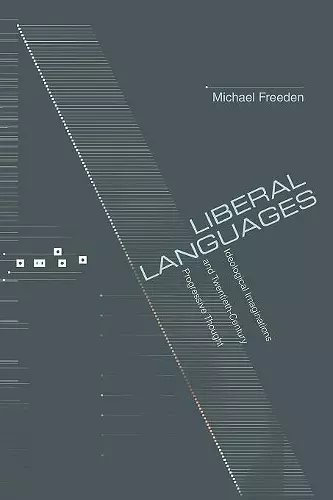Liberal Languages
Ideological Imaginations and Twentieth-Century Progressive Thought
Format:Paperback
Publisher:Princeton University Press
Published:12th Nov '04
Should be back in stock very soon

Michael Freeden has made a significant contribution to the field, his scholarship is exemplary and he writes well. The chapters here are among the best he has ever written. -- Mark Bevir, University of California, Berkeley Freeden's book offers a fresh, critical take on standard political philosophy and commentary. -- Ross Harrison, Cambridge University
Freeden employs the complex theory of ideological analysis that he developed in previous works to explore in considerable detail the experimental interfaces created between liberalism and neighboring ideologies on the left and the right.Liberal Languages reinterprets twentieth-century liberalism as a complex set of discourses relating not only to liberty but also to welfare and community. Written by one of the world's leading experts on liberalism and ideological theory, it uses new methods of analyzing ideologies, as well as historical case studies, to present liberalism as a flexible and rich tradition whose influence has extended beyond its conventional boundaries. Michael Freeden argues that liberalism's collectivist and holistic aspirations, and its sense of change, its self-defined mission as an agent of developing civilization--and not only its deep appreciation of liberty--are central to understanding its arguments. He examines the profound political impact liberalism has made on welfare theory, on conceptions of poverty, on standards of legitimacy, and on democratic practices in the twentieth century. Through a combination of essays, historical case studies, and more theoretical chapters, Freeden investigates the transformations of liberal thought as well as the ideological boundaries they have traversed. He employs the complex theory of ideological analysis that he developed in previous works to explore in considerable detail the experimental interfaces created between liberalism and neighboring ideologies on the left and the right. The nature of liberal thought allows us to gain a better perspective on the ways ideologies present themselves, Freeden argues, not necessarily as dogmatic and alienated structures, but as that which emanates from the continuous creativity that open societies display.
"Michael Freeden is ... perhaps the most distinguished practitioner of his generation [of the ideas in context school]... Freeden emphasizes that ideology is a structure which both enables and constrains political agency ... and illustrates through his marvelous tale of the New Liberalism hijacking the old."--Robert E. Goodin, Political Theory "In many ways this is an ideal collection... What Freeden does succeed in showing in Liberal Languages is that anyone who hopes to understand 'the actual political thought of a society' must understand it 'through its ideologies, that is, through the configurations and clusters of interdependent political concepts and ideas that circulate in that society at different levels of articulation' ... it is more than enough to support his claim that 'a major redevelopment of political theory has been occurring ...' --a major redevelopment that exists largely because of the exemplary work of Michael Freeden."--Richard Dagger, History of Political Thought "This is a rich and rewarding collection of essays ... and much is gained form their consolidation... A fine selection of essays and an excellent introduction to the work of a distinguished historian of twentieth-century ideas."--James Thompson, Twentieth Century British History "Michael Freeden has established a substantial reputation as the principal interpreter of the New Liberal political thinking of the early 20th century, while making a major contribution to the broader understanding and analysis of political ideologies, and their relation to more abstract political theorizing. The current collection of previously published articles and chapters is divided more or less evenly between these two concerns... A body of work that, by its very refusal of rigid system, continuously raises new and important questions of both interpretation and theory."--Rodney Barker, Contemporary Political Theory "This is a rich and rewarding collection of essays. Some of the pieces are now well known, but others are not; and much is gained by their consolidation... [A]n excellent introduction to the work of a distinguished historian of twentieth-century ideas."--James Thompson, Twentieth Century British History "Michael Freeden has established a substantial reputation as the principal interpreter of the New Liberal political thinking of the early 20th century, while making a major contribution to the broader understanding and analysis of political ideologies, and their relation to more abstract political theorizing. The current collection of previously published articles and chapters is divided more or less evenly between these two concerns. One of the strengths of Freeden's work is his treatment of political thinking as having an historical, as against a logical, coherence."--Rodney Barker, Contemporary Political Theory "In many ways this is an ideal collection... [A] major redevelopment [of political theory] exists largely because of the exemplary work of Michael Freeden."--Richard Dagger, History of Political Thought
ISBN: 9780691116785
Dimensions: unknown
Weight: 425g
280 pages